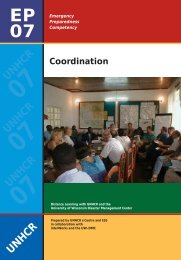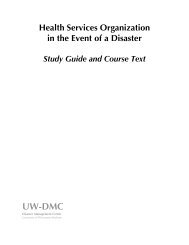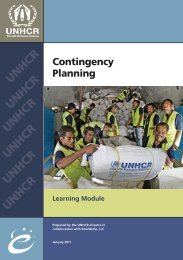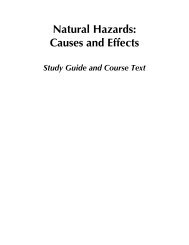Managing External Relations - Disaster Management Center ...
Managing External Relations - Disaster Management Center ...
Managing External Relations - Disaster Management Center ...
You also want an ePaper? Increase the reach of your titles
YUMPU automatically turns print PDFs into web optimized ePapers that Google loves.
Annex 2<br />
UNICEF responds in emergencies to protect the rights of children. In co-ordination with<br />
United Nations partners and humanitarian agencies, UNICEF makes its unique faculties<br />
for rapid response available to its partners to relieve the suffering of children and those<br />
who provide their care.<br />
UNICEF is non-partisan and its co-operation is free of discrimination. In everything it<br />
does, the most disadvantaged children and the countries in greatest need have priority.<br />
UNICEF aims, through its country programmes, to promote the equal rights of women<br />
and girls and to support their full participation in the political, social, and economic<br />
development of their communities.<br />
UNICEF works with all its partners towards the attainment of the sustainable human<br />
development goals adopted by the world community and the realization of the vision<br />
of peace and social progress enshrined in the Charter of the United Nations.<br />
World Food Programme (WFP), headquartered in Rome, plays the central role in co-ordinating and<br />
delivering food assistance in emergencies. At the start of the emergency, WFP establishes information<br />
systems to collect, analyse and disseminate food aid data to keep all involved agencies informed.<br />
WFP delivers food at extended delivery points, as close as possible to the final destination, where<br />
distribution is carried out by collaborating agencies including UNHCR and NGOs. (WFP and UNHCR<br />
have a memorandum of understanding regarding provision of food aid as a function of the size of<br />
the emergency population.) Protracted refugee or displaced person operations (PROs/PDPOs) are<br />
established in cases where food aid continues to be required one year after an emergency erupts.<br />
The following is on the World Wide Web at (http://www.wfp.org/info/POLICY/Mission.html)<br />
WFP Mission Statement<br />
WFP is the food aid arm of the United Nations system. Food aid is one of many instruments<br />
that can help to promote food security, which is defined as access of all people at<br />
all times to the food needed for an active and healthy life. The policies governing the use<br />
of World Food Programme food aid must be oriented towards the objective of eradicating<br />
hunger and poverty. The ultimate objective of food aid should be the elimination of<br />
the need for food aid.<br />
Targeted interventions are needed to help improve the lives of the poorest people—<br />
people who, either permanently or during crisis periods, are unable to produce enough<br />
food or do not have the resources to otherwise obtain the food that they and their<br />
households require for active and healthy lives. (Note: the full mission statement<br />
continues in more detail from this point.)<br />
World Health Organisation (WHO) is the lead agency within the UN system for health-related<br />
aspects of emergencies and advises other partners on co-ordination in this field. The WHO division of<br />
Emergency and Humanitarian Action (EHA) is responsible for health co-ordination in emergencies<br />
and seeks to strengthen national capacities of Member States to reduce the effects of disasters.<br />
WHO provides expert advice on epidemiological surveillance, control of communicable diseases,<br />
public health information and health emergency training. WHO maintains a global reserve to serve<br />
priority medical needs and has an extensive roster of medical experts and collaborating institutions.<br />
The following is on the World Wide Web at (http://www.who.int/aboutwho/en/mission.htm)<br />
WHO Mission Statement<br />
The objective of WHO is the attainment by all peoples of the highest possible level of<br />
health. Health, as defined in the WHO Constitution, is a state of complete physical, mental<br />
EP<br />
04<br />
101








